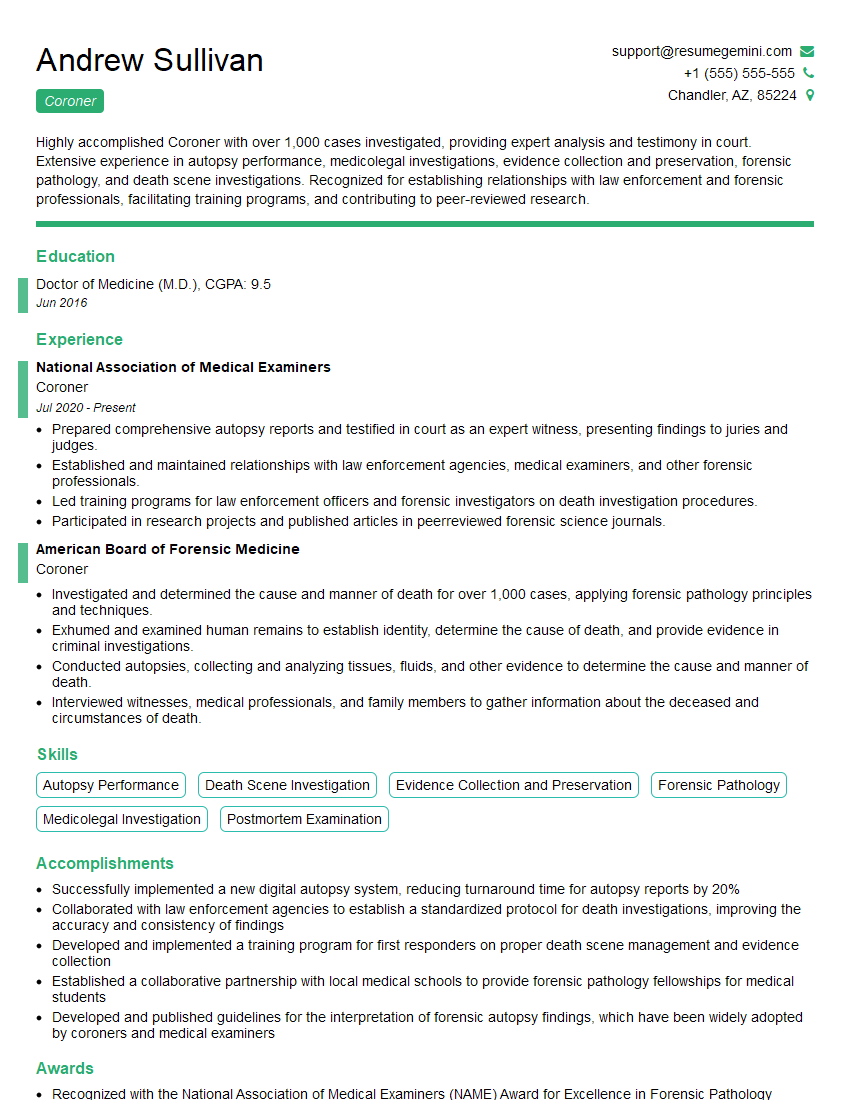Are you a seasoned Coroner seeking a new career path? Discover our professionally built Coroner Resume Template. This time-saving tool provides a solid foundation for your job search. Simply click “Edit Resume” to customize it with your unique experiences and achievements. Customize fonts and colors to match your personal style and increase your chances of landing your dream job. Explore more Resume Templates for additional options.

Andrew Sullivan
Coroner
Summary
Highly accomplished Coroner with over 1,000 cases investigated, providing expert analysis and testimony in court. Extensive experience in autopsy performance, medicolegal investigations, evidence collection and preservation, forensic pathology, and death scene investigations. Recognized for establishing relationships with law enforcement and forensic professionals, facilitating training programs, and contributing to peer-reviewed research.
Education
Doctor of Medicine (M.D.)
June 2016
Skills
- Autopsy Performance
- Death Scene Investigation
- Evidence Collection and Preservation
- Forensic Pathology
- Medicolegal Investigation
- Postmortem Examination
Work Experience
Coroner
- Prepared comprehensive autopsy reports and testified in court as an expert witness, presenting findings to juries and judges.
- Established and maintained relationships with law enforcement agencies, medical examiners, and other forensic professionals.
- Led training programs for law enforcement officers and forensic investigators on death investigation procedures.
- Participated in research projects and published articles in peerreviewed forensic science journals.
Coroner
- Investigated and determined the cause and manner of death for over 1,000 cases, applying forensic pathology principles and techniques.
- Exhumed and examined human remains to establish identity, determine the cause of death, and provide evidence in criminal investigations.
- Conducted autopsies, collecting and analyzing tissues, fluids, and other evidence to determine the cause and manner of death.
- Interviewed witnesses, medical professionals, and family members to gather information about the deceased and circumstances of death.
Accomplishments
- Successfully implemented a new digital autopsy system, reducing turnaround time for autopsy reports by 20%
- Collaborated with law enforcement agencies to establish a standardized protocol for death investigations, improving the accuracy and consistency of findings
- Developed and implemented a training program for first responders on proper death scene management and evidence collection
- Established a collaborative partnership with local medical schools to provide forensic pathology fellowships for medical students
- Developed and published guidelines for the interpretation of forensic autopsy findings, which have been widely adopted by coroners and medical examiners
Awards
- Recognized with the National Association of Medical Examiners (NAME) Award for Excellence in Forensic Pathology
- Honored with the American Board of Forensic Examiners (ABFE) Fellowship for outstanding contributions to the field of forensic science
- Recipient of the International Association of Coroners and Medical Examiners (IACME) Distinguished Service Award
- Recognized by the Society of Forensic Toxicologists (SOFT) for significant contributions to forensic toxicology research
Certificates
- Board Certified Forensic Pathologist
- National Registry of Emergency Medical Technicians (NREMT)
- American Board of Medicolegal Death Investigators (ABMDI)
- Certified Medicolegal Death Investigator (CMDI)
Career Expert Tips:
- Select the ideal resume template to showcase your professional experience effectively.
- Master the art of resume writing to highlight your unique qualifications and achievements.
- Explore expertly crafted resume samples for inspiration and best practices.
- Build your best resume for free this new year with ResumeGemini. Enjoy exclusive discounts on ATS optimized resume templates.
How To Write Resume For Coroner
- Highlight your expertise in forensic pathology, emphasizing your knowledge of anatomical and physiological changes related to death.
- Showcase your experience in death scene investigations, detailing your ability to gather and interpret evidence effectively.
- Emphasize your skills in autopsy performance, including proficiency in tissue and fluid analysis, and provide examples of complex cases you have handled.
- Quantify your accomplishments whenever possible, using specific numbers to demonstrate the impact of your work.
Essential Experience Highlights for a Strong Coroner Resume
- Investigate and determine the cause and manner of death through forensic pathology principles and techniques
- Exhume and examine human remains to determine identity, establish cause of death, and provide evidence
- Conduct autopsies, collecting and analyzing tissues, fluids, and other evidence to ascertain cause and manner of death
- Interview witnesses, medical professionals, and family members to gather information about the deceased and circumstances
- Prepare comprehensive autopsy reports and present findings as an expert witness in court
- Maintain relationships with law enforcement agencies, medical examiners, and other professionals in the forensic field
- Conduct training programs for law enforcement and forensic investigators on death investigation procedures
Frequently Asked Questions (FAQ’s) For Coroner
What is the role of a Coroner?
A Coroner is a medical professional responsible for investigating deaths that occur under suspicious or unclear circumstances, determining the cause and manner of death, and providing expert testimony in court.
What are the qualifications required to become a Coroner?
Typically, a Coroner is a medical doctor (MD) with specialized training in forensic pathology. They may also have experience in law enforcement or death investigation.
What are the key responsibilities of a Coroner?
Coroners investigate deaths, perform autopsies, analyze evidence, and provide expert testimony in court, assisting in determining the cause and manner of death.
What are the challenges faced by Coroners?
Coroners often work in emotionally challenging situations, dealing with sudden and unexpected deaths. They must maintain objectivity and professionalism while conducting thorough investigations and presenting findings in a clear and concise manner.
What is the job outlook for Coroners?
The job outlook for Coroners is expected to remain stable or grow slightly in the coming years due to the increasing need for forensic experts in law enforcement and the medical field.
What are the career advancement opportunities for Coroners?
Coroners can advance to roles such as Chief Medical Examiner, Forensic Pathologist, or Director of Forensic Services, overseeing larger teams and complex investigations.